Winter is already a harsh season for wild animals, and we can unknowingly add to their troubles. Activities like snowmobiling, heliskiing, or even just skiing and snowboarding can disturb wildlife, forcing animals to search out new places to eat and rest at a critical time when they are already under stress.

Outdoor activities
Before you head out to enjoy the crisp air and breathtaking views, take a moment to discover some ways you can minimize disturbance to wildlife. The provincial government makes the following recommendations:
- Stay on established trails or in areas of high visibility where no wildlife is present.
- Obey all signs and area closures.
- Never approach, chase or harm any wildlife.
- Avoid damaging vegetation.
- Pack out what you pack in never leave trash or equipment behind.
- Keep dogs on a leash and away from wildlife.
- When on a motorized vehicle in an open area, try to keep a distance of 500 metres away from large mammals. For non-motorized activities, stay 100 metres away.
- When you spot wildlife crossing a road or trail while on a motorized vehicle, turn off your engine, remain on the machine and yield to the animals. For non-motorized activities, remain still or retreat when animals are encountered and react to your presence.
What impact does winter recreation have on wildlife?
When wild animals are disturbed, they go on the alert. Assessing danger takes time and energy – which should be used for other important activities such as feeding, resting and even hibernating.
- If animals decide to flee from the disturbance, they may have no choice but to settle in a new area that is far from optimal – an area with more predators, fewer resources and greater competition.
- Adult male elk are often in relatively poor condition as winter begins. Many have sustained injuries as a result of rutting activity in the fall. The quality of winter habitat alone may determine whether some males survive the season.
- While a single disturbance may not seem significant, consider the impact and stress of interactions with multiple outdoor enthusiasts over the course of the season.
- Chronic stress can impair immune responses, making wildlife more susceptible to parasites and diseases. Animals may lose weight and die of malnutrition, or be less able to escape predators. The consequences are often subtle and delayed.
Winter Wildlife Resources:
- Keeping hummingbirds safe in winter
- Create a backyard haven for wildlife in winter
- 4 ways to help wildlife this holiday season
WildSense newsletter
Want to receive more stories like this, right in your inbox? Subscribe to WildSense, our bi-monthly wildlife newsletter.
The BC SPCA uses your personal information to update you on our work for animals as well as for advertising and analytics purposes. More information on uses and how to opt-out can be found in our Privacy Policy.
